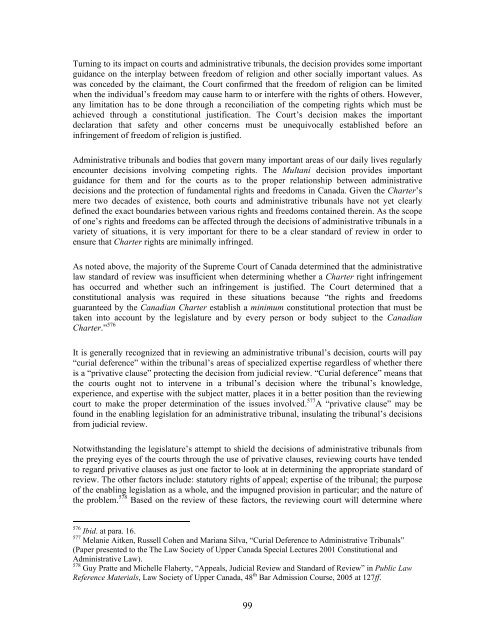Volume IV, Issue II (April 2006) - Columbus School of Law
Volume IV, Issue II (April 2006) - Columbus School of Law
Volume IV, Issue II (April 2006) - Columbus School of Law
Create successful ePaper yourself
Turn your PDF publications into a flip-book with our unique Google optimized e-Paper software.
Turning to its impact on courts and administrative tribunals, the decision provides some importantguidance on the interplay between freedom <strong>of</strong> religion and other socially important values. Aswas conceded by the claimant, the Court confirmed that the freedom <strong>of</strong> religion can be limitedwhen the individual’s freedom may cause harm to or interfere with the rights <strong>of</strong> others. However,any limitation has to be done through a reconciliation <strong>of</strong> the competing rights which must beachieved through a constitutional justification. The Court’s decision makes the importantdeclaration that safety and other concerns must be unequivocally established before aninfringement <strong>of</strong> freedom <strong>of</strong> religion is justified.Administrative tribunals and bodies that govern many important areas <strong>of</strong> our daily lives regularlyencounter decisions involving competing rights. The Multani decision provides importantguidance for them and for the courts as to the proper relationship between administrativedecisions and the protection <strong>of</strong> fundamental rights and freedoms in Canada. Given the Charter’smere two decades <strong>of</strong> existence, both courts and administrative tribunals have not yet clearlydefined the exact boundaries between various rights and freedoms contained therein. As the scope<strong>of</strong> one’s rights and freedoms can be affected through the decisions <strong>of</strong> administrative tribunals in avariety <strong>of</strong> situations, it is very important for there to be a clear standard <strong>of</strong> review in order toensure that Charter rights are minimally infringed.As noted above, the majority <strong>of</strong> the Supreme Court <strong>of</strong> Canada determined that the administrativelaw standard <strong>of</strong> review was insufficient when determining whether a Charter right infringementhas occurred and whether such an infringement is justified. The Court determined that aconstitutional analysis was required in these situations because “the rights and freedomsguaranteed by the Canadian Charter establish a minimum constitutional protection that must betaken into account by the legislature and by every person or body subject to the CanadianCharter.” 576It is generally recognized that in reviewing an administrative tribunal’s decision, courts will pay“curial deference” within the tribunal’s areas <strong>of</strong> specialized expertise regardless <strong>of</strong> whether thereis a “privative clause” protecting the decision from judicial review. “Curial deference” means thatthe courts ought not to intervene in a tribunal’s decision where the tribunal’s knowledge,experience, and expertise with the subject matter, places it in a better position than the reviewingcourt to make the proper determination <strong>of</strong> the issues involved. 577 A “privative clause” may befound in the enabling legislation for an administrative tribunal, insulating the tribunal’s decisionsfrom judicial review.Notwithstanding the legislature’s attempt to shield the decisions <strong>of</strong> administrative tribunals fromthe preying eyes <strong>of</strong> the courts through the use <strong>of</strong> privative clauses, reviewing courts have tendedto regard privative clauses as just one factor to look at in determining the appropriate standard <strong>of</strong>review. The other factors include: statutory rights <strong>of</strong> appeal; expertise <strong>of</strong> the tribunal; the purpose<strong>of</strong> the enabling legislation as a whole, and the impugned provision in particular; and the nature <strong>of</strong>the problem. 578 Based on the review <strong>of</strong> these factors, the reviewing court will determine where576 Ibid. at para. 16.577 Melanie Aitken, Russell Cohen and Mariana Silva, “Curial Deference to Administrative Tribunals”(Paper presented to the The <strong>Law</strong> Society <strong>of</strong> Upper Canada Special Lectures 2001 Constitutional andAdministrative <strong>Law</strong>).578 Guy Pratte and Michelle Flaherty, “Appeals, Judicial Review and Standard <strong>of</strong> Review” in Public <strong>Law</strong>Reference Materials, <strong>Law</strong> Society <strong>of</strong> Upper Canada, 48 th Bar Admission Course, 2005 at 127ff.99
















